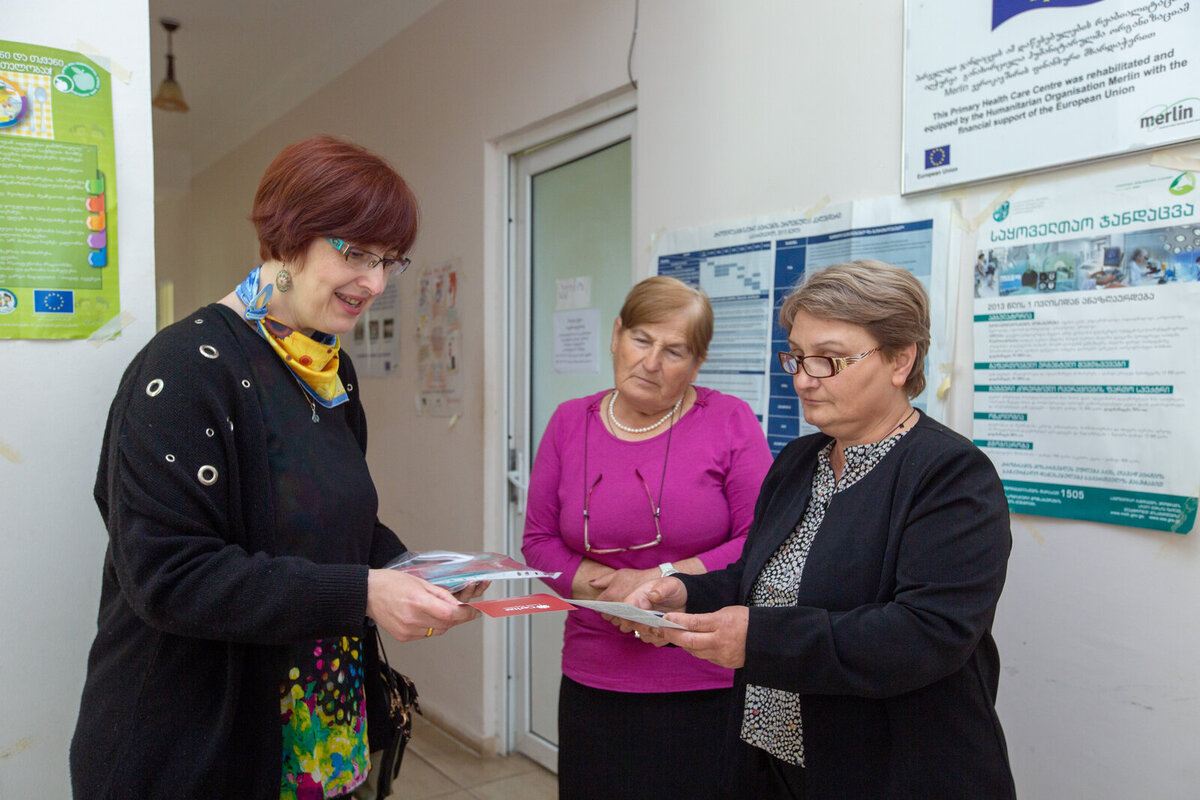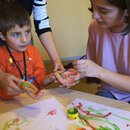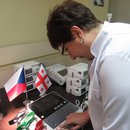Caritas Czech Republic has been strengthening the primary health care of Georgia by supporting the Government of Georgia to implement systemic changes as well as ensuring continuous education and capacity-building activities for the medical personnel across the whole country.
The challenges Georgia's primary health care meets today
In response to the emergency caused by the spread of the COVID-19, in 2020, Caritas Czech Republic and the United Nations Children's Fund (UNICEF) implemented a joint project to ensure the continuity of maternal and child health services. In 2021, the mentioned cooperation continued with the support of the United States Agency for International Development (USAID) and made a significant contribution to the improvement of the quality of children's medical services by practice facilitation of rural doctors and experts’ consultations.
What are the challenges facing the primary health care of Georgia, in which direction it needs the most support, and what are the results of the project on which the mentioned organizations worked in 2022 – we sat with Tako Ugulava, a health specialist of the UNICEF to talk about this.
The primary health care of Georgia faces lots of challenges and donor organizations have been supporting the Government of Georgia to coping with them for years. Where do you see the biggest problem at this stage and how do you see the way of solving it?
The primary healthcare sector of Georgia is facing a lot of problems, which the country is trying to eliminate through various reforms. Unfortunately, none of these reforms often come with an appropriate legacy. A reform begins, then its face changes, and as a result, we have a process in which there are ups and downs. Unfortunately, there is no systematic work done in this direction yet.
This is not only a problem of primary healthcare but also of the Georgian healthcare system in general. When a country develops a coherent vision in which all stakeholders are involved, including citizens, professionals, and the Government, then neither fluctuations or changes in government nor any other factor will have a radical impact on it.
The problem is that our primary health care has been the victim of radical fluctuations many times. As a result, every time the system started to be arranged in a new way, it could not function, or go further as it had to move to another wave. This is the main reason why primary health care could not be organized in Georgia, otherwise, the necessary technical support and desire to organize this system was always on the right place.
As for the blocks that the system itself consists of, that is where we have the most trouble, and the trouble is practically everywhere. For example, let's start with the supervision system, which means that we keep our finger on the pulse – we know where there is a change, we get relevant data, analyze it and plan changes accordingly. It's really out of place.
Then comes the human resource component, which is very weak, not because anyone is weak, but because it has its own rules. Health care is developing at a fast pace in the world, and in order for the service provider to keep up with it, it is necessary to update their knowledge periodically. The country does not work on continuous medical education, therefore, people have outdated knowledge.
If we talk about the issue of primary health care financing, it is not new that the financing model is wrongly assembled. More efforts are being made to increase the referrals to hospital services and less emphasis is being made on primary health care as a whole. The information system is also faulty – data is not collected and analyzed.
To summarize briefly, all the constituent blocks of the system are in trouble. Therefore, when we talk about any reform, first of all, we need to have a very systematic approach to everything.
The United Nations Children's Fund and Caritas Czech Republic were among the organizations that, upon the spread of the COVID-19 pandemic, changed their work direction and fully adapted their activities to contribute to the management of the emergency situation in the country. To what extent can it be said that the project gave us long-term results?
Our cooperation with Caritas Czech Republic began in 2020 in order to rapidly respond to the situation created by the pandemic. The context in which we set up the project was tailored to the emergency situation. And as it was adapted to a particular emergency situation, it should have no claim on further development, because all the activities carried out within the framework of this project was targeted aid.
As you know, during a pandemic, all protocols and standards change rapidly and new information needs to be provided on a daily basis. And at that time there was no practice and means of constant communication with doctors.
Within the framework of the project, Internet infrastructure and platform was created in the villages in the fastest time, which provided access to all doctors throughout the country, as well as to the information that was previously provided to doctors individually.
In the end, we found that humanitarian aid activities turned into development-oriented activities. The results obtained within the framework of the project cannot be evaluated as an immediate response to an emergency situation, because if you train personnel, systematize continuous education, and organize an appropriate training platform, it is no longer only for a particular emergency situation.
Thus, the biggest positive side of this whole collaboration was that the activities we planned responded to the need of the moment and at the same time focused on long-term development. This project has created such a valuable product, which the providers have also evaluated very positively – they say that they have not had such an opportunity for a long time.
Caritas Czech Republic and the United Nations Children's Fund cooperated on a daily basis, as hundreds of doctors across the country relied on their support. How would you evaluate this collaboration?
In general, it is of the utmost importance that you share common values with your partner, stand on the same platform and speak the same language. No less important is the flexibility of the organization, and how it follows you in the processes. Caritas Czech Republic showed a high level of flexibility, even in situations where small challenges arose, and they took care of them completely themselves. Caritas Czech Republic is one of the best partners we have ever had.
I must single out the strongest team of the organization, including the project manager, who was the motto of all these processes and great unity. She actually managed 1200 doctors on a daily basis and arranged everything in such a way that I had the opportunity to know daily which doctor is saying what, who is having trouble, and where the help is needed.
Scheduling the project this way was not part of the project planning. And the details and results we are talking about above are fully on the side of Caritas Czech Republic. I saw great technical knowledge and experience, both in terms of project management and primary health care. During that turbulent period, not a single issue arose that could have delayed the project.
Caritas Czech Republic has a team of professionals and if I have the opportunity to continue working with them, I will always be happy to do so.
Caritas Czech Republic and UNICEF continue their cooperation
Since early 2022, with financial support from USAID, Caritas Czech Republic and UNICEF carried out the project to ensure continuity and quality of maternal and child health services during the COVID-19 pandemic.
Within the initiative, all 1284 rural primary healthcare providers across the country were engaged in the project activities. Specifically, each rural clinic had an assigned trained practice facilitator who worked with the family doctors of approximately 30-35 ambulatories to improve their performance in the prevention and effective management of various childhood illnesses at the primary health care, including COVID-19.
After two successful projects implemented together with UNICEF since 2020, in July 2022,, our organization started working on a new initiative. The ongoing project, with the support of UNICEF and the financial assistance of the European Union, aims at the development of remote services and the establishment of a Primary Healthcare Quality Assurance and Quality Improvement Hub to ensure the quality of maternal and child health services.
Rusudan Chkhubianishvili, the project manager of Caritas Czech Republic, says that the tasks of the project are innovative since this is the first time in Georgia that remote services for patients and assessment of their development will be carried out through information technology:
"I hope that through the partners of the project – the Association of Family Medicine of Georgia and Consulting & IT Innovations, the project will be able to achieve its goals, and 50 clinics will have the opportunity to remotely provide high-quality services to the population."
50 ambulatory clinics throughout the country are involved in the project.












